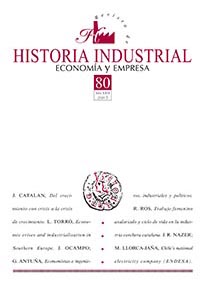Women’s waged work and life cycle in the catalan cork industry, c. 1860-1920
DOI:
https://doi.org/10.1344/rhi.v29i80.30771Keywords:
women’s activity rates, life cycle, cork industry, CataloniaAbstract
This article studies the feminisation process of the cork industry in the Girona region in the late nineteenth and early twentieth centuries. It also reconstructs women’s activity rates in 1920. The analysis of the life cycle’s influence on women’s labour-force participation underlines the diversity of local models, depending on labour demand. Whereas in those places where it was weak, only young single women worked, in those towns where labour demand was intense women worked for a wage after their marriage and, although female labour participation was not completely insensitive to variables such as the number of children or family structure (nuclear or stem), it was more decisively determined by the number of male workers in the household.
Downloads
Downloads
Published
How to Cite
Issue
Section
License
The author assigns all rights to the publisher. Creative Commons
The author who publishes in this journal agrees to the following terms:
- The author assigns all intellectual property rights exclusively to the publisher for the entire duration of the applicable intellectual property rights.
- The publisher will distribute the texts under the Creative Commons Attribution License, which allows others to share the work, provided that they acknowledge the authorship, its initial publication in this journal, and the conditions of the license.





